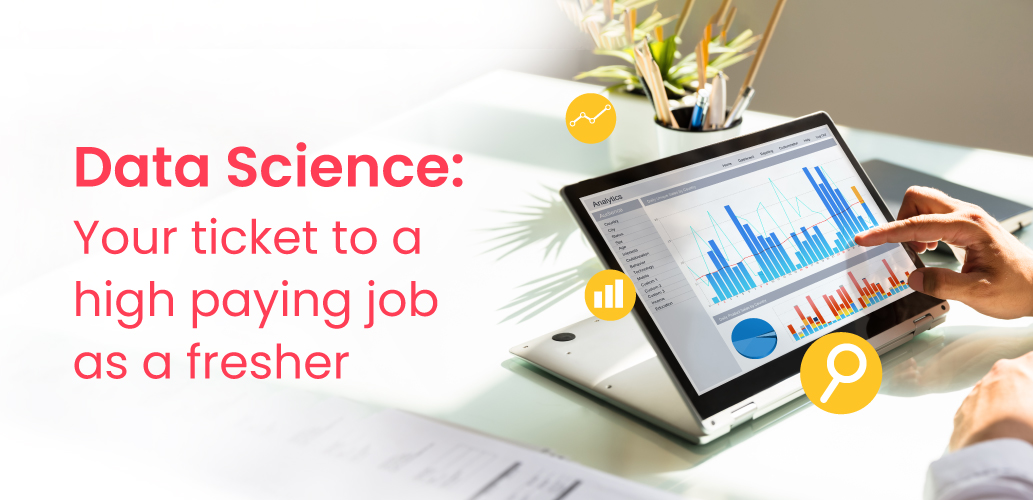Blog > Data Science: Your ticket to a high paying job as a fresher
Data Science: Your ticket to a high paying job as a fresher
January 27th, 2022

When Iron Man wasn’t suiting up in his den, he’d keep up a lively conversation with F.R.I.D.A.Y, flicking a chart here, expanding a graph there, and coming up with a brilliant solution to an end-of-the-world problem. In that one moment, he was being a data scientist - correlating huge volumes of information to make a decision.
There’s a good reason why Harvard, way back in 2012, called Data Scientist, the sexiest job of the 21st century. And it still holds true! Imagine sitting on a wealth of information and being able to see a picture that nobody else could.
But getting there takes a while. And that’s why, if you’re enamoured by this role, you should consider upskilling as early as you can.

But what exactly is Data Science?
Considering how large and complex the digital data universe is, it’s difficult to come up with a precise definition of a Data Scientist.
Broadly speaking, data scientists organise and interpret data, and specialise in one of the below aspects:
- Advanced Analytics - Be it in supply chain, IoT, healthcare or finance, Advanced Analytics plays a critical role in understanding customers. Advanced Analytics predicts patterns in customer behaviour, forecasting the likelihood of future events and allowing organisations with better decision making.
- Cyber Security- Anyone who has watched any series based on the 21st century, understands what Cyber Security is. But less is known about Data Science’s role in the same. When data science - specifically machine learning - is applied to cyber security, organisations are able to detect loopholes in their digital environment. Data Science also processes vast amounts of data to understand the behaviour of an attacker.
- Data Mining - Data mining is like any other form of mining. It involves cleaning, selecting and transforming - but the object that gets mined is data. Data mining is used to solve specific business problems like recognising fraudulent actions, supporting R&D processes, discovering relationships between customers and services, and more.
- Data Visualisation - As the name suggests, it is the process of visual representation of data and relationships. If you’re only thinking of pie charts and graphs, think harder. From box-and-whisker plots to choropleth maps, there’s a world of figures out there to visualise data and bring to light hidden correlations between various activities in business.
As you can see, these fields also overlap in many principles, and the common ground is the ability to understand and interpret data. No matter what specialisation you choose, or if you choose more than one, there are many exciting opportunities in front of you.
Scope of Entry-level Data Science Jobs
Clearly, Data Science is the stuff of big guns. So to do well, you need either a Bachelor’s Degree in this field or some work experience. If you don’t have any of these, you’d definitely need a certification in Data Science that covers Python, SQL and Machine Learning.

Once you have these skills, here are some positions you should look for if you have specialised knowledge of Data Science:
- Business Analyst: A business analyst interfaces with internal departments to collect, distribute and manage organisational data. This responsibility can also expand to analysing requirements, documentation of processes, user acceptance testing and more.
- Data Analyst: Starting from collecting and storing data, a data analyst must apply technical expertise to ensure the accuracy and quality of the data and come up with actionable insights. It’s a must for data analysts to have an eye for detail, a knack for scouring through data and putting the pieces together to form the big picture.
- Data Engineer: A data engineer applies machine learning techniques and develops algorithms to convert raw data into actionable information. Considering every business has its own type of information and setup, a data engineer fills in a key position to meet the specific data needs of an organisation.
- Data Generalist: Domain-agnostic by nature, a data generalist conducts an in-depth analysis of the organisation’s information systems, extracts insights from data and communicates them to business leaders. As they never deep dive into a specific vertical, a data generalist needs to have expertise in exploratory data analysis tools, scripting and modelling, data visualisation, etc.
- Business Intelligence Developer: A regular engineering position - the role of a Business Intelligence Developer is to interpret and present organisational data using business intelligence technology. Developing a BI interface needs an understanding of software, databases, data analysis and some level of industry-specific knowledge.
- Machine Learning Engineer: Another true-to-form technical position, machine learning engineers develop ML algorithms that analyse huge volumes of unstructured data and turn them into useful information. Text-to-speech conversions, meaningful auto-recommendations and self-running AI systems are some of the cutting-edge missions on the plate of a machine learning engineer.
These are but a few of the roles available in a career in Data Science. As organisations are unearthing the importance and the complexity of data, more domain-specific, function-specific and technology-specific roles are coming up, even as you are reading this.
Paygrade of Data Scientist

Being a vast and yet potentially untapped field, the pay range for a Data Scientist is as varied as the responsibilities they are able to fulfil. The more cross-skilling a Data Science professional is willing to do, the higher the pay they are assured.
In India, a Data Science professional, at an entry-level, can expect a minimum of ~ Rs. 3.5 lakhs and an average salary of Rs. 7 lakhs. Most MNCs, large organisations and even some startups offer a data science professional, without any field experience, a package of Rs. 5 lakhs, provided they know their stuff. In just 3 to 5 years of work experience, this number can raise up to Rs. 14-20 lakhs per annum.
The easiest way to fast-track this journey is by upskilling the right way - which involves not only training in technology, industry trends and emerging tools, but also how these aspects can be applied to real-world problems. Explore upGrad Campus’s industry-ready course in Data Science and Artificial Intelligence to know more about the career opportunities in this field.






Add a Comment